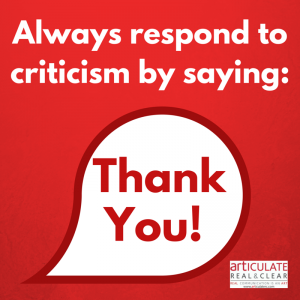“That’s bad. That’s just bad.”
I can still hear the director’s voice giving feedback on the scene we just rehearsed. And that’s the way it is for actors like me who have spent their entire careers perfecting a performance on stage: we constantly receive feedback, both positive and negative. It’s part of the process.
Granted, this negative feedback was not particularly helpful. It stung. And a little more specificity would have helped. Yet my fellow actors and I knew the scene needed work, so we dug in and kept at it.
In business, the same attitude is needed.
Being the best you can be is the goal for every business owner, and getting to the top takes work.
 Just as it is on the stage, the process of achieving success is a collaborative one. In every small business, there is an expectation that your co-workers and bosses (in my case, my fellow actors) will share their thoughts with you about what is working on a project or the business in general—and what it not. Sure, it’s completely subjective. That’s a given.
Just as it is on the stage, the process of achieving success is a collaborative one. In every small business, there is an expectation that your co-workers and bosses (in my case, my fellow actors) will share their thoughts with you about what is working on a project or the business in general—and what it not. Sure, it’s completely subjective. That’s a given.
But the cycle of feedback, and the subsequent adjustments, can lead to amazing experiences for customers (aka: audiences) if the ones in the spotlight can put their ego aside, listen with an open mind and open heart, and trust that the desired outcome will happen.
After all, feedback is essential to any living and growing organism. Without it, we undoubtedly stagnate.
The reason it works is that when you go through this exercise you are forced to consider how others are perceiving what you’re doing, whether it’s your presentation at a small business meeting or in front of large audience.
Do you need to develop a thick skin to be able to gracefully receive feedback?
No, but you do have to have an open mind and a receptive attitude. To beef up your feedback receptors, especially when it feels like you are under attack, try remembering these 10 essential truths:
- Feedback is part of the benefit, and power, of the collaborative process. When you are open to listening to what others you trust have to say, both the presentation and your skills will be better for it.
- To stay open, especially during what feels like a storm of criticism, adjust your attitude. Rather than getting defensive, see the criticism as a gift. As with all gifts, accept it graciously. Some of what is shared will be useful, and some you will end up passing on. Whether or not the criticism is helpful, recognize that it is usually shared to help improve a situation or presentation.
- Prepare yourself mentally. If you say that you’d like to get feedback, be ready for it. Listen. Simply receive it, and resist the temptation to give reasons or excuses about why you did this or that instead.
- Accept that getting defensive doesn’t help. Any comments you receive, positive or negative, simply show what others are experiencing from your performance. If they misheard you, misunderstood you, or completely missed something—that is important feedback.
- Assume responsibility for the clarity of your message, and please, don’t blame the audience. Remember that all feedback comes through the filter of the person giving it.
- Be careful not to dismiss what could be an important perspective, even if it makes you uncomfortable.
- Always respond to any criticism by saying “thank you.”

- Remember, you can say “no” or “that’s enough” at any point in the feedback process. Even in a setting where it has been established that you will be getting feedback, such as at work or in a coaching situation, you are free to set boundaries.
- If you do find yourself getting defensive, simply say “That’s plenty, thank you.” You can try again another time.
- Don’t mistake polite flattery for meaningful feedback. If you are only getting affirmative feedback, you aren’t learning everything you can. If you truly want to grow, ask other folks for their input.
Case in Point
I was amazed by a colleague who invited me—along with three other highly trained, highly critical speakers—to observe her presentation and give detailed feedback. For almost two hours, she sat and received detailed comments about what was working and what wasn’t.
Not once did she become defensive. If she needed clarification, she asked for it. If she thought it would be helpful for us to understand what she was talking about, she gave clarification. She never came across as defensive.
She is my new role model. Her presentation improved, not because she was at all bad before, but because she got insightful input and perspective that made her already effective presentation even better.
Imagine: What if you could hear all the things that are working, then hear some things that aren’t working, while continuing to keep in mind those that are working?
Wouldn’t that be wonderful and productive?
If you receive feedback on five things that are working fantastically, and one suggestion for something that could be better, the one suggestion for improvement does not in any way negate any of the five positive comments.
Feedback doesn’t have to be difficult to hear. We have the ability to invite criticism as part of our process for improving and recognize its power to help us grow and thrive.
So embrace opening the gift of criticism. Enjoy reviewing the feedback you receive and figuring out how best to incorporate it. One thing is certain: We must be open to criticism in order to improve. Welcoming feedback is what leads to growth and expanded opportunities.
This article was originally posted on BeInkandescent.com in November 2014.






